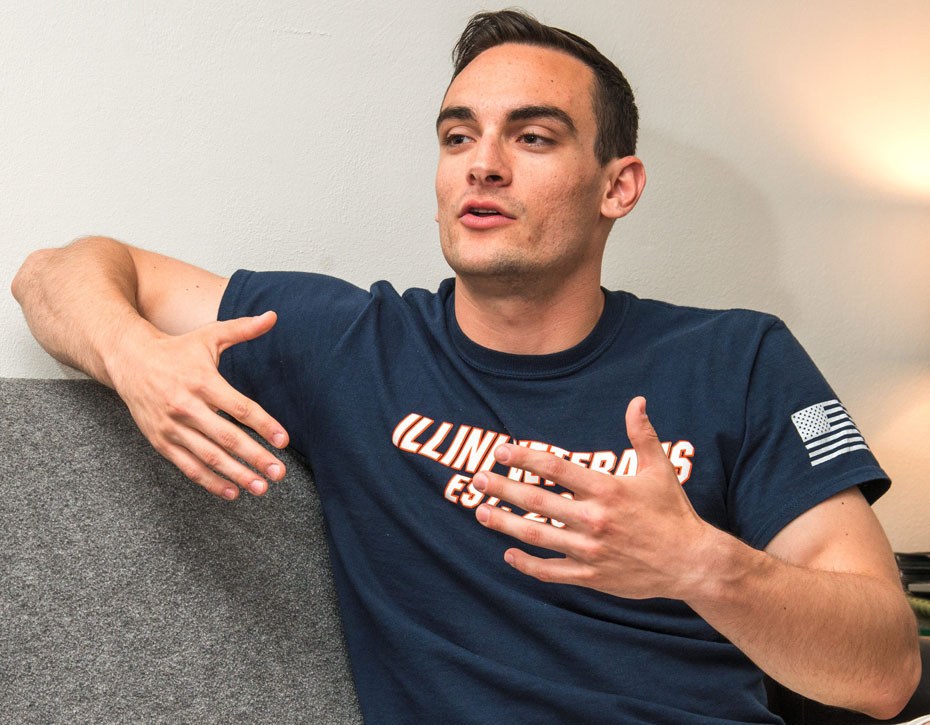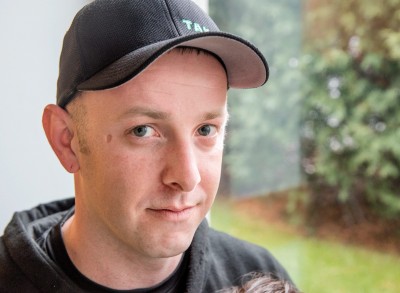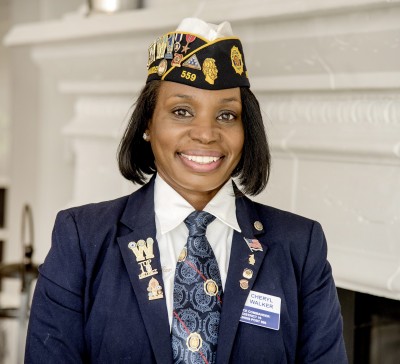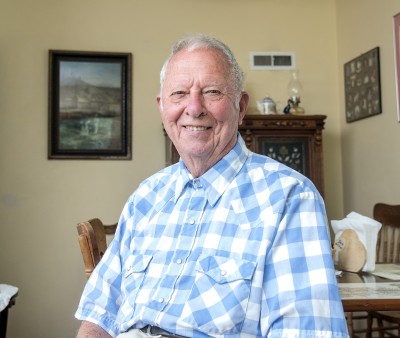Caleb Carlson
By Paul Wood

Photo By Robin Scholz/The News-Gazette
CHAMPAIGN — Caleb Carlson is new to the University of Illinois, but he’s already served a couple of tours in Afghanistan.
Originally from the Chicago area, he didn’t feel ready to commit to another four years of school after high school.
So he enlisted in the Army. There was that family military tradition, too.
“I’d do it all over again,” he says of his tours in 2012 and 2014. “If I was 18 again.”
Now he’s 23. He enrolled at the Urbana campus in August and left the service in late October, after a few trips to Fort Campbell, Ky., to finish things up.
He’ll major in business or engineering here.
In the Army, Carlson once served on sniper duty — never once having to shoot an Afghan, who commonly carry AK-47s as a tribal custom.
“A couple times I had people in my sights,” he says. “You have your eye on a lot of people. Everybody had an AK, but if you saw a drum magazine, that was something to take care of, get the weapon away or whatever.”
He served in the 101st Airborne on a mountain mission. Once made up of paratroopers, the elite unit now specializes in air assault, rappelling from Chinook helicopters.
“You might have to rappel 300 feet down a line,” Carlson says. “It’s pretty fun, but your hands do hurt because you’re carrying all the extra gear and body armor.”
Soldiers get pretty strong with rappelling and other activities, Carlson says.
“The Army taught me a lot about athleticism. I spent a lot of time in the gym,” he says.
A skinny middle distance runner in high school, Carlson gained 30 pounds in boot camp and then grew more muscle carrying a heavy pack.
Right now, his knee’s paying for it, but he’s doing exercises to remedy that.
The mountain stint was as tough as it could get, including his service in a harsh, isolated forward base in Afghanistan.
“There were long hikes with no sleep,” he says.
He was in Paktika Province in November 2012.
“We were set up to watch three different mountaintops and watching roads as (the U.S.) were pulling out of the area, hiking from one to another,” he recalls. “We watched the road to make sure nobody put in any IEDs.”
There was air cover, but it couldn’t always ensure their safety.
“There were a couple close calls where we saw guys with stuff that they shouldn’t have,” Carlson says. “Unfortunately, we couldn’t do anything about it. Air power couldn’t see them, and we couldn’t reach out far enough to shoot them.”
The conditions were killer.
“It was winter. The cold was one of the most dangerous things for me personally; we were about 3,000 feet up from where we are here, or more,” Carlson says. “The first night was probably one of the coldest nights of my life. When you stop shivering, you know things are starting to get pretty bad.”
Finally, they hiked back to where the unit was supposed to get picked up by helicopters.
“We were in a death bowl, high ground all around us, sitting in an open field. If they’d come up, we would have been completely done in. There was nothing to hide behind,” he says.
At one point, a gunner opened up from a U.S. helicopter, but no one was hurt.
The waiting was tough: “We get a call over the radio that says, ‘Yeah, there’s some clouds, we might not be able to get to you for another two or three days.'”
Things went from bad to worse to even worse.
“We’d run out of food at this point and were low on water, in the middle of this valley that wasn’t safe. Thankfully, they picked us up a few hours later,” Carlson recalls.
Back home, Carlson is taking advantage of special courses at the Chez Family Foundation Center for Wounded Veterans In Higher Education at the UI.
He even got a chance to talk with Sen. Dick Durbin at the center.
Veterans don’t need to be wounded to take advantage of classes and counseling in how to transition from one institution to a very different one, he says.
Because of his family tradition — including several officers in the family — Memorial Day is special for him.
Do you know a veteran who could share a story about military service? Contact staff writer Paul Wood at pwood@news-gazette.com.
Read more stories from local veterans:
 Dann Hufford
RANTOUL — Staff Sgt. Dann Hufford earned the Bronze Star facing down a truck full of explosives heading right at him. It …
Dann Hufford
RANTOUL — Staff Sgt. Dann Hufford earned the Bronze Star facing down a truck full of explosives heading right at him. It …
 Cheryl Walker
URBANA — Newly elected Cheryl Walker is the first female commander of the American Legion’s 19th District and, with husb …
Cheryl Walker
URBANA — Newly elected Cheryl Walker is the first female commander of the American Legion’s 19th District and, with husb …
 Don Saupe
URBANA — Apparently, silence is golden in the Army. Don Saupe was on a troop ship in the Pacific when the end of World W …
Don Saupe
URBANA — Apparently, silence is golden in the Army. Don Saupe was on a troop ship in the Pacific when the end of World W …